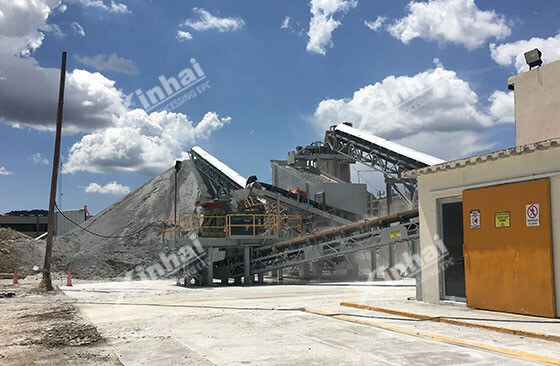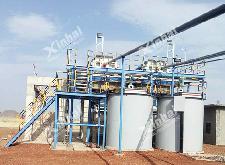

Warm Tip: If you want to know more details about equipment, solutions, etc, please click the button below for free consultation, or leave your requirements!
Here is the introduction of five flotation processes used to the extraction of lead-zinc sulfide ores.
In nature, the lead-zinc minerals mainly include lead-zinc sulfide and lead-zinc oxide ore. The lead-zinc sulfide accounts for a large proportion and has the higher industrial application value. The single lead sulfide or zinc sulfide ore are rare in nature. The most common lead -zinc sulfide ore is lead-zinc sulfide polymetallic ore.
According to the content of valuable elements, it can be divided into lead-zinc ore, lead-zinc sulfide ore and lead-zinc fluorite ore.

The extraction of lead and zinc sulfide ores need to be carried out before smelting. Because the material composition of lead and zinc ores is extremely complex, the flotation process is mainly used to the extraction of lead sulfide minerals and zinc sulfide minerals.
The common flotation processes mainly include five methods, there are: priority flotation process, mixed flotation process, iso-flotation process, branch flotation process and separation potential control flotation process.
Priority flotation process used to the extraction of lead-zinc sulfide ores is mainly to suppress zinc first then float lead, and then activate zinc, finally get lead and zinc concentrate.
According to the order of floatability and floating speed of lead-zinc and sulfur (pyrite),lead, zinc and sulfur(pyrite) minerals are recovered by flotation process oneby one, and finally the lead, zinc and sulfur concentrates are obtained respectively.
The priority flotation process is suitable for used to the extraction of lead-zinc sulfide ores with simple mineral composition, high grade of lead and zinc ores in the raw ores, large difference in the floatability of lead and zinc minerals, and coarse-grained lead and zinc ores.
Its advantages are easy to control in the production process, high quality of concentrate, easy to handle simple minerals, and small fluctuation of flotation index.
The mixed flotation process used to the extraction of lead-zinc sulfide ores is to float the lead and zinc sulfide together first as the mixed concentrate, and then separate the lead and zinc.
That is, first float all lead sulfide, zinc sulfide minerals into the mixed concentrate,respectively obtained lead and zinc sulfide mixed concentrate and waste tailings, and then remove the reagent from the mixed concentrated for all separation or part of separation.
The mixed flotation process used to the extraction of lead-zinc sulfide ores can discard a large amount of gangue minerals after rough grinding, reduce the processing capacity of subsequent operations, save the dosage of separation agents, reduce energy consumption. It is suitable for the extraction of lead-zinc sulfide ores with little difference in floatability,low grade, and closely symbiotic useful minerals.

The iso-flotation process used to the extraction of lead-zinc sulfide ores is to separate lead and zinc sulfide with similar floatability together, and then separate lead and zinc sulfide. In ore dressing process, part of sphalerite has the close flotability with galena, a small minority of galena has the close flotability with sphalerite.
As a result, depending on the different flotability of lead and zinc minerals, a part of zinc mineral with good flotability floats synchronously in the priority flotation process, and the rest of zinc minerals float with the lead flotation, and then remove the zinc from the lead concentrate and remove the lead from the zinc concentrate to obtain lead concentrate and zinc concentrate respectively.
Iso-flotation process is suitable for the extraction of lead-zinc sulfide ores that the useful minerals contain easy-to-float and difficult-to-float lead-zinc minerals.
The iso-flotation process used to the extraction of lead-zinc sulfide ores has the characteristics of both mixed flotation process and priority flotation process, which can reduce the reagent dosage, eliminate the negative impacts of reagents on the flotation separation and improve the advantages of the mineral processing index. But the iso-flotation process has relatively complex flow, long flotation time and heavy equipment consumption.
The branch flotation process used to the extraction of lead-zinc sulfide ores is mainly to float aimed at the quick floated and easy to floated lead-zinc ore, while leave the slow floated and difficult to floated lead-zinc ore in the subsequent floatation process.
The branch flotation process used to the extraction of lead-zinc sulfide ores is applicable to the lead and zinc sulfide minerals whose flotation process changes due to different inset components.
This process can reduce the configuration volume of flotation machine and the metal circulation and loss, save energy and reduce consumption while obtaining better flotation indexes.
The essence of pb-zn sulfide ore separation potential control flotation process is to change the conditions of electro chemical flotation system to control the sulfide minerals in the slurry system.
The process of oxidation-reduction reaction on the surface of the direction will change, even affect the sulfide ore surface state and product form on the surface of the collector in sulfide ore and stability, increase sulfide ore surface hydrophilic and hydrophobic properties, so as to achieve selective flotation separation of sulfide minerals.
The separation potential control flotation process is characterized by low reagent dosage, simple formulation, little environmental pollution and high selectivity, especially suitable for the separation of low-grade lead zinc sulfide ore.
The material composition of lead-zinc ore is extremely complex, which easily lead to different chemical reactions and then changes property changes of lead-zinc ore if the internal components are slightly improper, thus affecting the final flotation effect. It is suggested that each mine owner should make scientific and reasonable flotation process according to the dressing test report to avoid unnecessary economic loss.
Last: 3 Chrome Mining Process Cases and Related Equipments
Next: 7 Common Problems and solutions of Froth Flotation Method


What Are the Differences Between CIP and CIL?
 11665
11665
 0
0